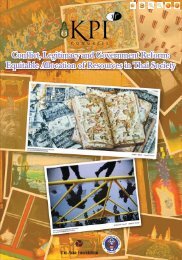SUFFiciENcy EcONOMy ANd GRASSROOtS DEvElOPMENt
SUFFiciENcy EcONOMy ANd GRASSROOtS DEvElOPMENt
SUFFiciENcy EcONOMy ANd GRASSROOtS DEvElOPMENt
Create successful ePaper yourself
Turn your PDF publications into a flip-book with our unique Google optimized e-Paper software.
226<br />
The Meaning of Sufficiency Economy <br />
International Conference<br />
what was formerly the p?ch?, ‘haunted forest’ where cremations and burials took<br />
place. In the 1970s and early 1980s this latter forest had been significantly reduced<br />
as villagers had expanded cultivation of cash crops. It also had ceased to have its<br />
traditional function after a more modern crematorium was built in the grounds of the<br />
wat. <br />
In the late 1980s, however, a thudong, or ascetic monk, established a residence<br />
in the remaining part of the forest. This ‘forest wat’ has become the center for annual<br />
religious retreats. <br />
Villagers and others at an annual meditation retreat at the forest<br />
monastery in Bãn Nông Tün in January 2005 (photo by Charles Keyes)<br />
In cooperation with villagers and with the support of a faculty member from<br />
Mahasarakham University, the monk persuaded villagers to begin a reforestation<br />
project. This project entailed planting many different species of trees found in<br />
traditional forests. Today, the forest is thriving and still expanding, with some<br />
funding provided by villagers who work elsewhere. <br />
T h e f o r e s t m o n a s t i c r e t r e a t i n B ã n N ô n g T ü n h a s b e<br />
come the center for a reforestation project (photo by Charles Keyes)<br />
The two forest monks who have resided in the forest monastic settlement since<br />
it was founded exemplify the significance Buddhist values even for those who may<br />
lead very this-worldly lives. Both monks before ordaining had spent many years in<br />
the military, and one had had some success in business. Living in the forest has<br />
enabled both to spend most of their time in meditation and study of Buddhist<br />
teachings. They also lead meditation retreats for villagers, and once a year hold a<br />
two week long retreat which attracts people from many villages.<br />
While most visitors to the village would be first impressed by the new houses<br />
and the new enterprises, the forest monastery and the traditional wat stand as<br />
reminders that villagers do not only value capitalist development. They remain<br />
attached also to a different economy – one rooted in their Buddhist traditions.<br />
<br />
CONCLUSIONS<br />
Villagers are not nostalgic for the world their parents and grandparents lived in<br />
and which I had the opportunity to observe in the early 1960s. Although they still do<br />
produce the rice that is basic to their diet and many also raise some vegetables and<br />
fruits, they also like having more meat and a variety of foods which they purchase.<br />
A few women still make traditional textiles for use for rituals and other festive<br />
occasions, but all like being able to buy most of their clothes. They like living in<br />
houses made of purchased materials and built by laborers whom they hire. They<br />
very much appreciate having electricity and many electrical appliances which make<br />
their lives more comfortable and enjoyable. In short, they like to enjoy the same<br />
middle class style of life that most in Bangkok and other urban areas have.














